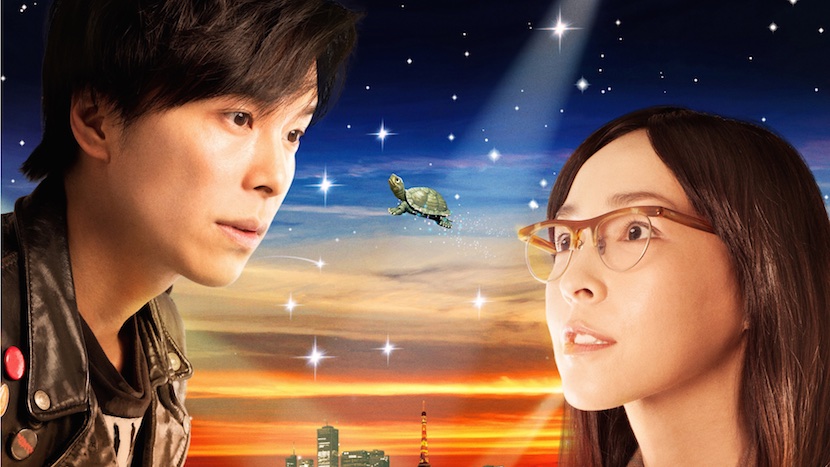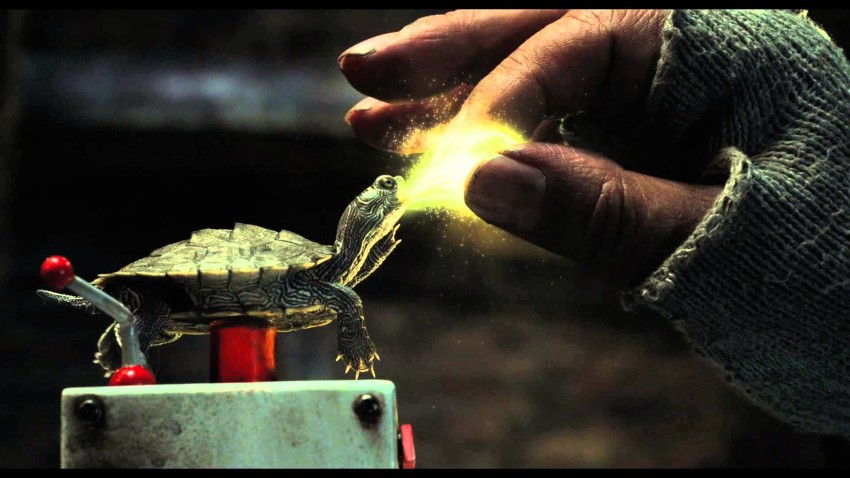Love and Peace
July 9, 2016 · 0 comments
By Jeremy Clarke.
 Sion Sono’s wonderfully insane, four-hour art-house epic Love Exposure (2008) made great waves on its UK release with its heady brew of father-son relationships, Catholicism, sin, teen gangs, martial arts stunts, up-skirt photography, violence, swordplay, castration, porno movie production, religious cults and more. Nothing in his prior directorial career had made quite the same impact on these shores. Subsequent Sono films to receive a UK release such as serial killer outing Cold Fish (2010), heartfelt post-tsunami drama Himizu (2011) and earthquake nuclear crisis epic The Land of Hope (2012) may have been impressive but they never quite reached the same dizzying heights. His demented rap musical about warring gangs Tokyo Tribe (2015) didn’t quite hold the audience’s attention in the same way. Happily, however, the extraordinary Love and Peace (2015) is a welcome return to form.
Sion Sono’s wonderfully insane, four-hour art-house epic Love Exposure (2008) made great waves on its UK release with its heady brew of father-son relationships, Catholicism, sin, teen gangs, martial arts stunts, up-skirt photography, violence, swordplay, castration, porno movie production, religious cults and more. Nothing in his prior directorial career had made quite the same impact on these shores. Subsequent Sono films to receive a UK release such as serial killer outing Cold Fish (2010), heartfelt post-tsunami drama Himizu (2011) and earthquake nuclear crisis epic The Land of Hope (2012) may have been impressive but they never quite reached the same dizzying heights. His demented rap musical about warring gangs Tokyo Tribe (2015) didn’t quite hold the audience’s attention in the same way. Happily, however, the extraordinary Love and Peace (2015) is a welcome return to form.
https://www.youtube.com/watch?v=P16WqrpB88k
The wishy-washy title is the perfect for this particular film. Love and Peace opens with a Japanese TV panel discussion about the forthcoming Tokyo 2020 Olympics. The panel agrees this event will bring prosperity to all Japanese. Except Ryoichi Suzuki (33), who after no-one showed up to his first three concerts, quit being a rock star at age 21 then took a job as a corporate clerk. He’s considered a national disgrace.
In fact hapless Tokyoite Ryoichi (Hiroki Hasegawa) has a pretty sad private life alternating between the TV on in his cramped apartment and sitting in an office cubicle doing mindless work for a company with the slogan, “there is no music without components”. Bullied mercilessly by his fellow workers he is admired by shy office girl Yuko Terashima (Kumiko Aso).
When he stumbles on a street vendor and ends up buying a turtle, Ryoichi suddenly has a friend, and his TV news-defined world starts to transform. Taking his cues from the TV, he christens his new pet Pikadon after the Japanese slang term for a nuclear explosion. The news the completion of Japan’s stadium spurs Ryoichi to write a to-do list, which soon transforms into an obstacle course for the turtle, with a model stadium at its far end… where Ryoichi intends to play a gig.
 He takes Pikadon to work but his co-workers’ disdain pushes Ryoichi to flush the turtle and his dreams down a toilet. He then staggers guilt-ridden round Tokyo, composing a lament for Pikadon from words and phrases on posters he sees.
He takes Pikadon to work but his co-workers’ disdain pushes Ryoichi to flush the turtle and his dreams down a toilet. He then staggers guilt-ridden round Tokyo, composing a lament for Pikadon from words and phrases on posters he sees.
At this point writer/director Sono ratchets up the proceedings onto two additional levels. In the first, guitarist Shu (Eita Okuno) and his band Revolution Q abduct Ryoichi, causing him to be seen performing impromptu at a gig and signed to a label by A&R woman Matsui (Miyuki Matsuda) whose record company exec colleague Satoru Inagawa (Kiyohiko Shibukawa) will later advise him to dump the band, go solo and play his dream Nippon Stadium gig. In the second, he follows Pikadon’s travels down the sewer to a basement where alcoholic but kindly Pa (Toshiyuki Nishida) rescues unwanted pet animals and repairs broken toys. In Pa’s care the turtle is accidentally fed a Wish Candy which causes the creature to manifest its deepest desires through its body and grow to about a metre across. It not only finds its way back to Ryo to sing him songs and provide him with exploitable musical material but also grows further to full-on kaiju size for a thoroughly satisfying, Tokyo devastation/Nippon Stadium finale.
Ryo’s journey from hapless office worker to rising rock star works very well as a music industry satire, while the parallel underground plot involving speaking toys and animals proves as engaging and child-friendly as Australia’s talking farm animal epic Babe (1995). At times the human performers are in danger of being upstaged by their special-effects counterparts who also include Sulkie the cynical toy black cat, PC-300 the robot who looks like an homage to Star Wars’ R2D2, and a doll named Maria whose name suggests a nod to the female robot in Metropolis (1927). As if all that wasn’t enough of an attraction, Pa spends half an hour of the film dressed as Father Christmas.
Perhaps the smartest idea here is the generic overturning of the kaiju genre. Where the original Godzilla (1954) was part of Japan’s way of dealing with the aftermath of the Hiroshima and Nagasaki bombings, Love and Peace has Ryo rob atomic terminology of its meaning by applying it as a name to a diminutive turtle. In order to keep Ryo’s lament commercial, the record company replaces the word “Pikadon” with “Love and Peace”, thereby removing the song’s anti-nuclear reference. Pikadon’s subsequent gargantuan dimensions turn the whole reversal on its head again.
Love and Peace is released on UK DVD and BD on 11th July by Third Window Films.
Leave a Reply